
You Won’t Believe How Much Cash NZ Customs Dogs Find Per Year
2-minute read
A recent recruit to our Detector Dogs team, Kane, a black Labrador, has been proving his worth at the border.
Based in the South Island with his handler Senior Customs Officer Robert Gillanders, Kane is trained to find large amounts of cash and has been sniffing out the dosh on a weekly basis.
Although he is yet to find undeclared cash over the $10,000 threshold, Kane has sniffed the wallets of plenty of travellers who have declared their wads of cash and has picked up on a couple of these each week.
“This shows that Kane is up to the task and that anyone trying to move cash illegally will be caught,” says Rob.
“With more travellers declaring their cash the message that you need to declare cash amounts of $10,000 or more is getting across.”
Kane is currently being trained to detect drugs too, including cocaine, methamphetamine, pseudoephedrine, heroin, and ecstasy.
At the conclusion of the training, the team will be redeployed to the South Island working in various locations in the southern region.
“Every day is interesting working alongside Kane. He’s one of my favourite colleagues and we get on really well,” says Rob.
“Then at the end of the day, he becomes a much-loved family member. He’s a great worker and also great fun.”
In August last year, Customs introduced four dual-trained dogs in Auckland and Wellington capable of detecting cash amounts of more than $10,000, as well as detecting drugs.
Since becoming fully operational, the five cash detectors have sniffed out more than $2.5 million cash, including $385,000 detected during the initial pilot.
False cash declarations or “non-reporting of cash” may result in the money being forfeited and seized by the authorities.
While there is no limit on the amount of cash you can bring into New Zealand, if you have NZ$10,000 or more on you — or the foreign currency equivalent — you will need to complete a Border Cash Report.
This helps in detecting money laundering and other serious offences, as well as enforcing the Criminal Proceeds (Recovery) Act 2009.
Source: NZ Customs
We’d love to answer any of your questions! Contact us now
P.S. Do you know of other people that will find this article useful? Please share it on social media. Thank you!
